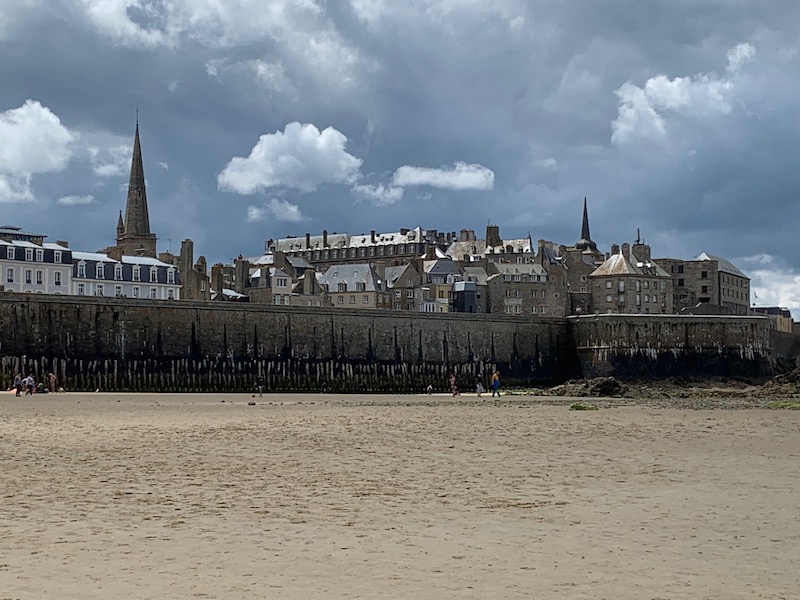Two days on the Côtes-d’Armor—in Saint Malo, the wonderful fortified Corsair town, and textbook bit of Vaubanian excellence—amidst France coming out of le confinement. Masks are obligatoire in most places, at least for entering and exiting. Fascinating to see how quickly their use, and their omnipresence, has worked its way into the everyday, into fashion, into the interplay of manners and interactions at all levels. The eyes are doing as much work as always, of course, but now more people are paying close attention. Smiling, frowning, and flirting—from the nose up—are all being refined as people begin to depend on them to navigate the streets, bars, and markets of a country that counts on all six to make it through the day.

Walking the ramparts as I did a couple of times every day gives one a chance to examine in some detail this most liminal of zones. On one side, a vibrant town—rebuilt as it had to be after its almost total destruction in the days leading to the defeat of the Nazis and their not entirely foolish desire to destroy what they could not have—and on the other, one of the most dynamic bits of ocean in the world—where tides can shift the worlds of water and land by tens of meters in only a few hours. And like most liminal zones—first articulated by the romans with their use of that word—interaction between one and the other is what makes life possible.
Seafood is the staple crop, and Saint Malo is nothing if not a practical reminder of how hard we work to stay alive, and how willingly we do it. Particularly these days, as so many of the easy ways to make money have evaporated from the sun-warmed stones along this temperate stretch of water, labor is finding a resurgence. Out of necessity if nothing else. And yet, even still, there were more than a handful of berths unoccupied. The dredging of the seas, and the other tidal forces of European politics, are taking their toll. Saint Malo and its tourists—almost entirely French at the moment—are as essentially intertwined as the hundred-ton deep sea trawlers and les monuments historique are for the survival of the town.
Chatting one evening with a small group from Orleans, one heard the same refrain that underlies the operatic absurdity of so much of our public life these days. Fear that the order that has held together—and in many ways permitted—the life we’ve been able to love these past decades is failing. And failing dangerously. As much distain for Macron as for Trump, and a sadness that we can no longer trust those we’ve elected to do what’s needed. Yet, our little gathering—made up of peoples from France, England, and America—could still laugh, down our wine, and find in each other those things that had knitted us together for the last seventy-plus years. Some needed encouragement for me, particularly since it was my first time out of my little commune in months.
I’ve returned to LaBu for a last week of hard labor before the vicissitudes of politics and sense and want call me back to Tbilisi, to a place I hardly remember. No, that’s not right. It’s not that I can’t remember my place in the Caucasus, but that even there, things will be so different, and may remain so, as to be barely recognizable.
Tonight, an early and simple meal, and an early bed—the better to be prepared for what’s to come.


Be the first to reply